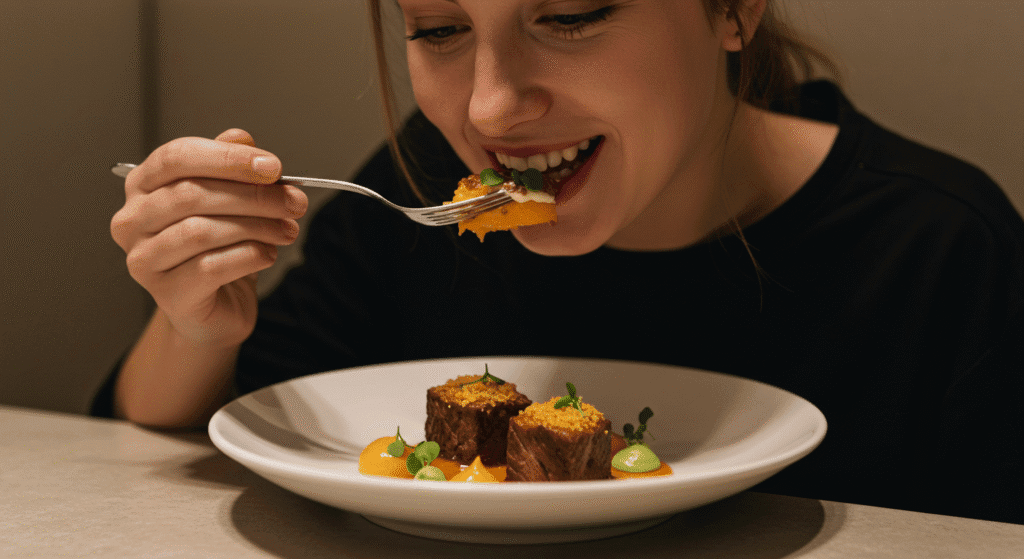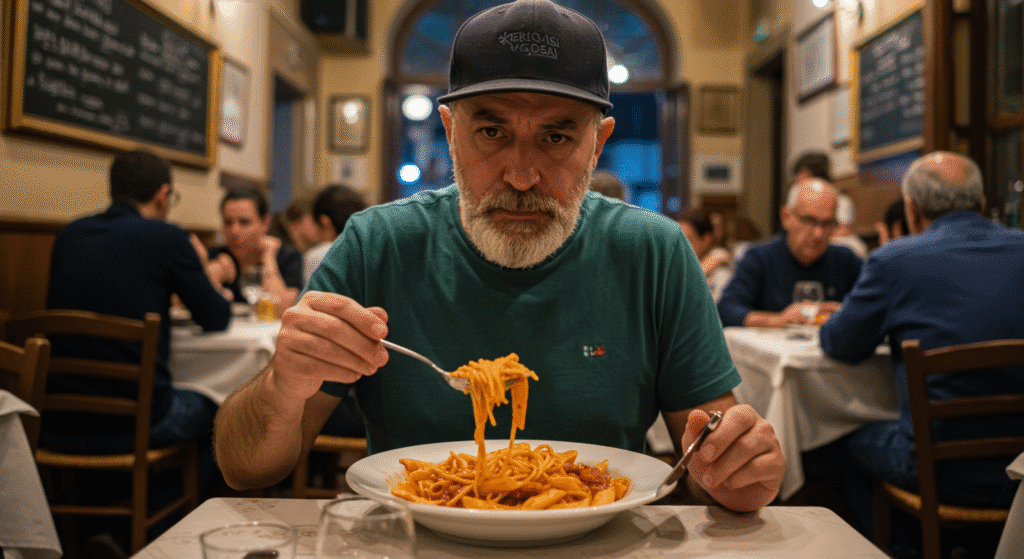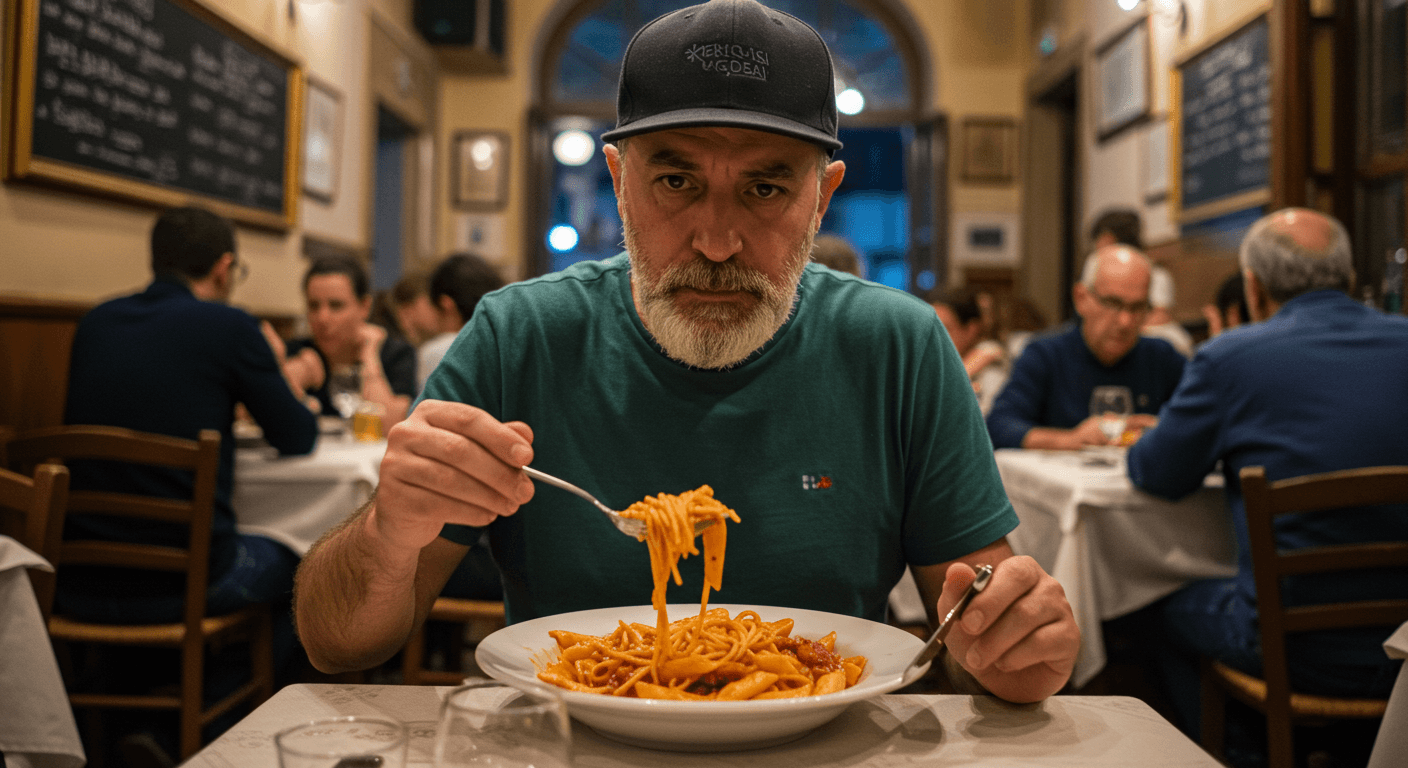It's easy to forget one of life's best pleasures—eating—when you're always busy. How often do we eat lunch while looking at our phones or watching TV? If you're like me, probably way too often. Mindful eating is what you need to do there. It's about taking your time, paying attention, and really enjoying your food. So get a snack (maybe something healthy?) and let's get started with the wonderful world of mindful eating!
Top Takeaways and Key Concepts
Eliminate distractions while eating: Put away phones, TVs, and devices to focus on your food.
Engage all senses: Notice taste, texture, aroma, and appearance to fully experience each bite.
Chew slowly and mindfully: Take 20–30 chews per bite to aid digestion and recognize fullness.
Balance indulgence with healthy choices: Enjoy treats in moderation without guilt to sustain long-term habits.
Create mindful meal environments: Set small goals, take deep breaths, and find calm even in chaos.
Summary of This Article
This article emphasizes the importance of mindful eating for physical and emotional well-being. Being present during meals improves digestion, helps recognize fullness, reduces stress, and prevents overeating. Mindful eating also fosters a healthier relationship with food, allowing indulgences without guilt while maintaining balance. Practical strategies include eliminating distractions, engaging all senses, chewing slowly, and creating peaceful eating environments. By treating meals as enjoyable experiences and integrating mindfulness consistently, individuals can enhance both their nutritional habits and overall enjoyment of food.
What Is Mindful Eating?

Please Note: This post may contain affiliate links. If you click one of them, we may receive a commission at no extra cost to you. As an Amazon Associate, I earn from qualifying purchases.
Mindful eating isn't just a fancy word that nutritionists use to appear smart. It's a real discipline that helps us pay closer attention to what we eat and how it affects our bodies. Picture this: instead of mindlessly eating chips while binge-watching your favorite program, you take a moment to enjoy each crunchy bite. You can taste the saltiness on your tongue and hear the delightful crunch in your ears. It sounds like a dream, right?
Being mindful of what you eat means paying attention to your body's hunger signals and knowing when you're satisfied. It tells us to enjoy the tastes and textures of food instead of just eating it to stay alive. Who really wants to spend life without good food? This habit not only makes our connection with food better, but it can also help us make healthier choices over time.
It's interesting that studies have shown that those who eat mindfully tend to have better digestion and less stress when it comes to food. This isn't simply a crazy claim; science backs it up! Mindful eating means not merely putting food into our mouths while we watch TV or surf through social media. Instead, we are totally present with our meals, enjoying each bite and paying attention to how our bodies react.
You might not even notice how much you've eaten until your plate is empty and your jeans feel a little tighter if you're not paying attention as you eat. But when you pay attention to what you're eating, like the bright colors of fresh veggies or the strong smell of roasted chicken, you make the meal more delightful. This increased awareness helps your body digest food better since it tells your digestive system that food is coming in. Our stomachs can start performing their magic sooner rather than later!
Also, being present at mealtime helps us pay closer attention to our body's hunger signals. Have you ever reached for another serving just because it was there? Or maybe you ate dessert even though you were already full? When we eat mindfully, we learn to tell when we've had enough. It’s like turning off that autopilot mode and engaging with our bodies instead.
There are many more benefits! Being mindful when eating might also help you feel less stressed about what you eat. A lot of us have worried about what we should and shouldn't eat, especially with all the new diets that are out there. When we practice mindful eating, though, we stop following tight rules and start to relax. Most days of the week, we learn to enjoy sweets without feeling bad about it while still putting healthy options first.
This feeling of freedom can change our connection with food in a big way, which is interesting. Instead of seeing meals as things that make you stressed or anxious, they become chances to interact with others and have fun, whether it's by sharing a meal with loved ones or trying new flavors in foods you don't know.
To sum up, being mindful while you eat not only helps your digestion, but it also makes you feel better about the food choices you make. We may appreciate every meal and become more aware of what our bodies need by focusing on what we're eating instead of allowing distractions drag us away from the moment. So the next time you're ready to eat, take a moment to breathe deeply and get involved. It could make a big impact!
The Benefits of Mindful Eating

You might be asking why anyone would want to work hard at something as basic as eating. Let me tell you, it has some really great benefits! To start, being conscious when you eat can aid your digestion because chewing well makes it easier for our systems to break down food. Who knew that being present may help keep you from feeling bloated after lunch?
On the other hand, mindful eating also has an emotional side. A lot of individuals eat to deal with stress, like when they eat a whole tub of ice cream at midnight. But if we learn to eat consciously, we can start to notice what makes us upset instead of reflexively grabbing for comfort foods when things go tough.
Studies also show that those who eat mindfully are less likely to feel guilty or ashamed about what they consume. Isn't that a nice thought? Picture a world where you don't feel bad after eating dessert! When we eat mindfully, we stop seeing food as something that has rigid restrictions and severe judgments and start seeing it as something that is more caring and balanced.
Let's be honest: a lot of us have done it—sneaking a piece of cake and then feeling like we've done something wrong in the kitchen. But when you practice mindfulness, eating dessert becomes a wonderful component of your diet instead than a time of weakness. We learn to enjoy each taste of chocolate mousse or gooey brownies without feeling guilty about it.
The most important thing is to find a balance. Mindful eating helps us realize that all meals may be part of a healthy lifestyle if we eat them in moderation. Instead of saying, “I shouldn't be eating this,” when you see that rich piece of pie at dinner, try saying, “This is a nice treat that I can enjoy.” This way, you can enjoy the good things in life without worrying that you're ruining your health goals.
Research suggests that this change in perspective not only makes people feel less guilty, but it also helps them eat better in the long run. We may break the pattern of deprivation and bingeing by not calling foods “good” or “bad.” This means that there will be fewer late-night raids on the fridge because of emotions of limitation! When we have a better connection with food, we're more likely to make decisions that are good for us instead of out of fear or shame.
Also, accepting balance without judging ourselves lets us celebrate our successes as well! It's great that you chose a salad for lunch today and appreciated every crunchy bite. Or maybe you chose to have dessert after dinner since it was a special occasion. That's a terrific option! Instead of criticizing yourself, every choice gives you a chance to praise yourself.
Mindful eating, in a nutshell, gives us room to be compassionate to ourselves and the choices we make. It shows us that we may enjoy life while still eating healthy foods most of the time. So the next time dessert sings your name (and trust me, it will), remember that it's alright to treat yourself as long as you do it in moderation.
How To Practice Mindful Eating

So, how do we actually get started? I think it begins with creating a peaceful environment before diving into your meal. Try setting aside distractions like phones or TVs—yes, I know it's hard! Then take a moment for yourself; close your eyes and breathe deeply before taking that first bite.
When you finally sit down with your plate (or bowl), pay attention not just to what you’re eating but also how it feels in your mouth—the warmth of soup or the crispness of fresh veggies—and even its aroma! Speaking of which, try engaging all five senses during meals; this will make everything taste even better!
Another tip is to slow down while chewing each bite—aim for at least 20-30 chews before swallowing (I know it sounds tedious). But trust me; this gives your brain time to catch up with your stomach so you don’t end up looking like a chipmunk hoarding acorns!
Finally—and this part is super important—listen closely when your body tells you it's full! Sometimes we ignore those signals because we're caught up in conversation or distracted by whatever's happening on Netflix.
Overcoming Challenges with Mindful Eating

Let's be honest: starting any new habit is hard, especially one as fun as mindful eating! To begin with, a lot of people have trouble quitting habits that they have had for years or even decades. If you've been used to eating supper while doing chores or looking through social media at the same time, then yes, it will require some work!
But here's my favorite part: you can always transform these problems into entertaining experiments! Set little goals for each week. For example, you could try to have one meal without any interruptions and be fully present. From then, slowly build up until you're having whole days of being present around food!
It's also important to remember that society puts a lot of emphasis on meals. Family gatherings can be loud and chaotic, which is the opposite of what you need for mindfulness activities. I mean, have you ever attempted to eat while Uncle Bob goes on and on about his most recent fishing trip in excruciating detail? It's like trying to meditate at a rock concert! When this happens (and trust me, I've been there), it might be hard to locate the quiet place you need to eat mindfully.
You don't need a peaceful mountaintop or a quiet library to practice mindfulness, though. You can find little pockets of peace even when things are crazy at the holidays or a birthday party. Before you get in line for the buffet at your cousin's wedding, for example, take a moment to step away and take a deep breath. You really can feel better with just a few deep breaths. It helps you focus and remember why you're there: to enjoy delicious cuisine and good company, not just consume without thinking.
Before you sit down at the table, make a goal for yourself. You might just tell yourself, “I'm going to enjoy every bite” or “I'll listen to my body today.” You make a little shield against distractions by setting up this conceptual framework. When everyone around you is arguing about who brought the tastiest dish (spoiler alert: it was Grandma's pie), you may still focus on your personal experience. What flavors are dancing on your tongue? How do you feel after eating this meal?
If things become really crazy—like when children are running about with spaghetti sauce on their faces—you might want to take a quick break. Look for a quiet place to sit or go outside for some fresh air. This little break can help you clear your head so that when you go back to the party, you're ready to enjoy your food and those fun (but loud) relatives more fully.
And in all this enthusiasm, don't forget to watch how much you eat! When there are a lot of tasty foods competing for our attention, it's tempting to just put everything on our plates without thinking. But mindfulness practice makes us want to start with fewer servings. This manner, we give ourselves space to really enjoy what we're eating without feeling full later. Also, there's always room for more if you truly like something!
It's interesting that taking these breaks not only makes our meals better, but it also helps us connect more deeply with the people around us. We learn to enjoy talking and laughing during the meal, not just what's going on outside, like Aunt Sally's wonderful potato salad. When you eat mindfully, it's less about being flawless and more about being there.
When you're busy with family gatherings or holiday celebrations, remember that you can stay aware even when you're not alone at home. You may become more conscious even in the middle of a lot of fun turmoil by using a few easy techniques, including taking deep breaths, setting goals, and taking breaks. And to be honest? That makes every meeting feel like a chance instead than a huge responsibility.
Creating Positive Associations with Food
Let's talk about making good connections now that we're on the subject of happiness at meals. Food doesn't have to be just for eating; it may also bring back joyful memories. Think about birthday cakes with lots of decorations or nice dinners with family and friends. These aren't simply meals; they're festivities full of affection.
To strengthen these feelings while being aware during meals, you need to be open to new things. Trying new things outside of your normal patterns might surprise you! Every Tuesday is taco night? How about adding Meatless Mondays with spicy vegetarian stir-fries? Themed activities on regular nights make things more fun and exciting, and there are tasty adventures waiting for you!
Also, keep in mind that treating yourself every now and again doesn't imply giving up on your health goals. Balance is key! It sounds hard, like trying to ride a unicycle while juggling blazing torches, but with experience, you can discover the sweet spot where everything works. Food should be one of those tiny things that make life worth living.
It's easy to imagine that healthy eating means not eating anything when we think about food. But let me tell you, that's not true at all! Instead of seeing food as a set of severe rules (yawn! ), see it as a chance to be creative and have fun. Think of how great it feels to have a piece of dark chocolate after a long day or to eat pizza with friends on Friday night. Those times are just as vital as eating kale salad for lunch!
To make food and fun meaningful relationships, we need to accept everything that food can do for us. When I make a vibrant stir-fry with lots of veggies and spices, I'm not only giving my body food; I'm also making an experience. It's like painting a picture that you can eat when you hear the pan sizzle and see the colors mingle together. We turn meals become celebrations instead of chores by making cooking pleasant and interesting.
And don't forget that this balance goes beyond what we eat. Food is a big feature of many social events, such birthday parties with cake or holiday feasts with family favorites. These times are great times to treat yourself without feeling bad because they are linked to memories and connections. We can develop a healthier attitude about our decisions by not worrying about every calorie we eat and instead enjoying these moments.
Interestingly, research shows that people who let themselves have treats every now and then are more likely to stick to their health goals in the long run. Why? Because they don't feel like they're missing out! You know that if you squeeze too hard, the balloon will pop. But if you let go just enough to appreciate the good things in life every now and again, you make room for flexibility while still keeping your main goals in mind.
We face a lot of temptations every day, like donuts at work meetings and late-night nibbles while binge-watching shows. It's important to remember that balance is critical. We can enjoy those unhealthy items while still making healthy choices most days of the week. This method gives us freedom without guilt, which is a tasty compromise that lets us enjoy life and stay healthy at the same time.
So the next time you see that delicious dessert or think about getting takeout instead of making something “healthy,” remember that indulging isn't giving up; it's just enjoying the tastes of life! Take in every bite completely. When we combine food with pleasure in our daily lives, we establish habits that nourish both our bodies and our souls.
In conclusion, and to be honest, it seems evident that adding mindfulness to our everyday meals makes us more aware of both the food and the flavor. By making people more conscious of what goes on their plates (and eventually in their stomachs), we help them build better relationships and open up delicious culinary excursions that are just waiting to be discovered!
Suggested Resources
Mindful Eating: A Guide
https://www.eatright.org/health/wellness/mindfulness/mindful-eating-a-guide
The Center for Mindful Eating
https://thecenterformindfuleating.org
How Mindfulness Can Help You Eat Better
https://www.healthline.com/nutrition/mindfulness-eating
Frequently Asked Questions
What is mindful eating?
Mindful eating involves paying attention to your food, focusing on taste and texture, and listening to your body’s hunger and fullness cues.
How does mindful eating help with weight loss?
It reduces overeating by helping you recognize fullness, improves digestion, and encourages healthier food choices through increased awareness.
Why is eliminating distractions important during meals?
Removing distractions helps you stay present, enjoy your food more, and avoid eating more than your body needs.
How many times should I chew each bite?
Chewing 20–30 times per bite supports digestion and gives your brain time to register fullness, preventing overeating.
Can I still enjoy treats while practicing mindful eating?
Yes, mindful eating encourages balanced indulgence, allowing you to enjoy treats in moderation without guilt.
What are some ways to create a mindful meal environment?
Use deep breaths, set small intentions, reduce noise, and focus on the sensory experience of your food.
How can I stay consistent with mindful eating?
Start with small goals, practice at least one mindful meal per day, and gradually build habits that fit your lifestyle.

Kevin Collier is a dedicated health enthusiast and writer for FatFAQ.com, where he shares his expertise on weight loss and maintaining a healthy lifestyle. With a focus on practical tips and evidence-based strategies, Kevin aims to inspire readers to achieve their health goals through informed choices. His engaging articles cover nutrition, exercise, and holistic wellness, providing valuable resources for anyone looking to improve their well-being. Passionate about helping others transform their lives, Kevin advocates for sustainable habits that promote lasting health and vitality.





